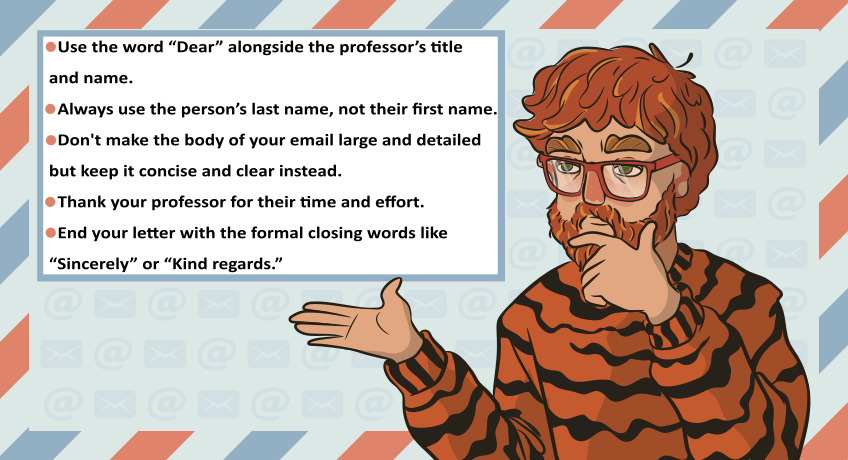How to Write an Email to Your Professor

How to Write an Email to Your Professor
Often students need to talk to their professor personally – apologize for a missed class, check grades, ask for advice, etc. However, talking to a professor in person is not always possible or convenient due to busy schedules. That’s one of the reasons why many professors prefer to communicate with students via email.
You might need to write an email to your professor but are unsure how to do it properly. Here are a few tips from us, including some templates.
First Check the Syllabus
This is the first step that any student should take before actually writing an email to their professor. There is plenty of useful information there, and sometimes there also might be guides on how to communicate with the particular professor – what time you should choose for your communication, what their email address is, and if there are some particular questions that you might find answers to without approaching your professor. You can also find some useful information on how to make connections with your professors.
For example, some professors have their private email and work email for emails like yours. Sometimes private contact information leaks due to various reasons and becomes accessible to students. Don’t make a mistake of writing directly to the first email address that you have found online. Check the syllabus for the email address that your professor wants you to use.
There also might be useful links to the guides or additional materials, assignments details, etc. that you might be looking for. So, for your professor, it will be noticeable that you didn’t even bother to pay attention to the information already given to you.
General Rules
Some professors are strict and formal, while others communicate with their students in an easygoing and friendly way. No matter what your professor is like, it’s better to follow the basic rules of a formal letter writing when approaching them.

EssayTigers. All rights reserved. Copyright © 2019
What are these rules? You might be familiar with the basics of letter (and email) etiquette and formal writing, such as:
- Filling the subject line properly
- Using proper salutations
- Avoiding slang
- Being concise and polite
- Avoiding grammar and punctuation mistakes
- Closing a letter with a proper ending
When writing an email to your professor, all of the rules above should be applied just like any other formal letter. Let’s get into more detail regarding each component of the letter and its general look.
The Subject Line
The letter starts with a greeting, right? Actually, no. If we are talking about email, it starts with the subject line. It should be filled properly and clearly in order to give an understanding of who is writing and what for.
These are the things to put in the subject line:
- Your course, class, section, last name
- The topic of the email: a question regarding test or material/class attendance/appointment, etc.
For example,
Donald Crane, LIT303, Question about Lecture Material
Salutation
Use the word “Dear” alongside the professor’s title and name. Always use the person’s last name, not their first name. There’s hardly anything about emailing your professor that can be “too formal.” Remember that it’s always better to get a reply like “You can call me Jack” instead of giving an impression of an impolite student.
If you address your email to a professor, you should always use the word “Professor” in your salutation instead of Mr., Ms., or Mrs. The same rule applies if your professor has a doctoral degree – in this case, you should use the word “Doctor” or “Dr.”
For example,
Dear Doctor Schneider,
Dear Professor Schneider.
The Body
The body of your email shouldn’t be large and detailed but concise and clear instead. Start with the point of your letter. If you need to give an explanation (for example, why you need to ask for an appointment or why you have missed a class), then it’s better to do it in one or two brief sentences.
Thank your professor for their time and effort.
The Ending
End your letter with the formal closing words like “Sincerely” or “Kind regards.” Don’t forget to put your information at the very bottom of the letter, including your full name, class, and section information.
Email to Professor Samples
We have prepared a few samples for various needs and occasions. Also, check out our article on how to ask your professor for a letter of recommendation.
Asking for an Appointment Letter
Subject: Jack Hackley, HIST123: Request for Appointment
Dear Doctor Buckley,
I am a student in your Art History class. I face some difficulties writing my term paper’s conclusion and would like to come to your office and talk about it. I checked your office hours, and they are scheduled on Mondays 1-3 PM. If this is correct, let me know if I may come.
Thank you for your time.
Kind regards,
Jack Hackley
Our Advantages
Quality Work
Unlimited Revisions
Affordable Pricing
24/7 Support
Fast Delivery